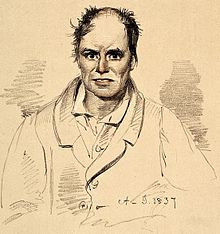
Back Depressie (gemoedstoestand) Afrikaans Depression ALS اكتئاب Arabic كتيئاب ARY Depresión AST Çarəsizlik Azerbaijani دپرسلیک (حالت) AZB Depresyon BCL Прыгнечанасць Byelorussian Прыгнечанасьць BE-X-OLD
| Depression | |
|---|---|
 | |
| Lithograph of a person diagnosed with melancholia and strong suicidal tendency in 1892 | |
| Specialty | Psychiatry, psychology |
| Symptoms | Low mood, aversion to activity, loss of interest, loss of feeling pleasure |
| Causes | Brain chemistry, genetics, life events, medical conditions, personality[1] |
| Risk factors | Stigma of mental health disorder[2] |
| Diagnostic method | Patient Health Questionnaire, Beck Depression Inventory |
| Differential diagnosis | Anxiety, bipolar disorder, borderline personality disorder |
| Prevention | Social connections, physical activity |
| Treatment | Psychotherapy, psychopharmacology |
| Part of a series on |
| Emotions |
|---|
  |
Depression is a mental state of low mood and aversion to activity.[3] It affects more than 280 million people of all ages (about 3.5% of the global population).[4] Depression affects a person's thoughts, behavior, feelings, and sense of well-being.[5] Depressed people often experience loss of motivation or interest in, or reduced pleasure or joy from, experiences that would normally bring them pleasure or joy.[6]
Depressed mood is a symptom of some mood disorders such as major depressive disorder and dysthymia;[7] it is a normal temporary reaction to life events, such as the loss of a loved one; and it is also a symptom of some physical diseases and a side effect of some drugs and medical treatments. It may feature sadness, difficulty in thinking and concentration and a significant increase or decrease in appetite and time spent sleeping. People experiencing depression may have feelings of dejection or hopelessness and may experience suicidal thoughts. It can either be short term or long term.
- ^ "Depression". Cleveland Clinic. 2022. Retrieved 9 June 2022.
- ^ Shrivastava A, Bureau Y, Rewari N, Johnston M (April 2013). "Clinical risk of stigma and discrimination of mental illnesses: Need for objective assessment and quantification". Indian Journal of Psychiatry. 55 (2): 178–82. doi:10.4103/0019-5545.111459. PMC 3696244. PMID 23825855.
- ^ "NIMH » Depression Basics". www.nimh.nih.gov. 2016. Archived from the original on 11 June 2013. Retrieved 22 October 2020.
- ^ "Depression". www.who.int. Archived from the original on 26 December 2020. Retrieved 7 April 2021.
- ^ de Zwart PL, Jeronimus BF, de Jonge P (October 2019). "Empirical evidence for definitions of episode, remission, recovery, relapse and recurrence in depression: a systematic review". Epidemiology and Psychiatric Sciences. 28 (5): 544–562. doi:10.1017/S2045796018000227. PMC 7032752. PMID 29769159.
- ^ Gilbert P (2007). Psychotherapy and counselling for depression (3rd ed.). Los Angeles: Sage. ISBN 978-1-84920-349-4. OCLC 436076587.[page needed]
- ^ American Psychiatric Association (2013). Diagnostic and Statistical Manual of Mental Disorders, Fifth Edition (DSM-5). American Psychiatric Association.[page needed]
© MMXXIII Rich X Search. We shall prevail. All rights reserved. Rich X Search